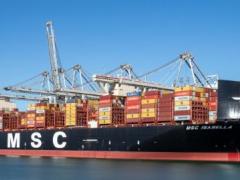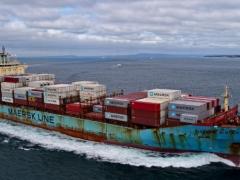'Shipshape ships don't deserve a penalty'
THE SPECTRE of over-age vessels has once again raised its ugly head.
This is now becoming about a two-yearly cycle, according to Craig Duffy - Safcor's seafreight insurance expert.
And this time, the creature has re-emerged from the swamp in the form of a mandatory over-age surcharge on insurance of cargo.
This, said Dave Keeling, m.d. of Cigna Insurance, and chairman of AMUSA (Association of Marine Underwriters of SA), comes about because of the Institute (of London Underwriters) classification clause.
In terms of this clause, bulk and combination carriers are hit by the surcharge after they turn 10-years-old. For mineral and oil tankers (exceeding 50 000 tons gross registered tonnage) it's also 10+.
For freighters the surcharge comes into play after 25 years for scheduled liners (like those of Safmarine, MACS and MSC), and 15 years for others - such as charter vessels.
The definition of those meeting the 25-year age restriction is: "Vessels which have established and maintained a regular pattern of trading on an advertised schedule".
But shipowners, shippers, forwarding agents and their insurance brokers, are not too happy about this surcharge being automatically imposed when a ship breaks the 25 year mark.
The argument here is that many of the ships from the reputable shipping lines are well-maintained and managed, and kept in A1 shipshape condition. "Do they deserve a penalty?" is the question asked.
And the surcharge is not light. According to Duffy the surcharge can often be much more than standard marine insurance rate. "It is up to the brokers concerned to try to get this surcharge waived," he said.
He and his company, Safcor, are currently negotatiating with their insurers on this subject. They feel that many of the vessels on the services they use are good enough to warrant exclusion from the surcharge - or at least be partly excused the full force of this penalty.
"We are looking at getting it waived or at least a concession - across the board on all commodities," said Duffy. "Although the vessels in the US/SA Conference are operated by reputable shipping lines, and are regarded as being in seaworthy condition, marine underwriters are now imposing the additional, over-age surcharge on them."
The surcharge is calculated from a formula which includes: commodity; age of vessel; and management quality - of a scheduled, regular liner
"In theory," said Keeling, "we have no choice."
But AMUSA is not totally lacking in flexibility.
Although it's a case of: "If one gets it, they'll all want it" - and would lead to "the many paying for the few" - the marine underwriters are not completely immune to the sense of the argument.
AMUSA currently has inspectors in Durban checking out certain individual vessels, according to Keeling.
"We are trying to co-operate with the lines on a close basis," he said, "and there could be exceptions to the clause.
"If warranted, consideration may be given."
But, Keeling points out, the association can only recommend. It's up to all the parties to negotiate their own conditions.
"But it's certainly not a cast-in-stone regulation," he added.
Comments | 0












